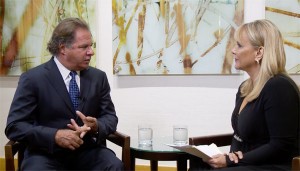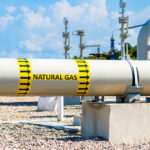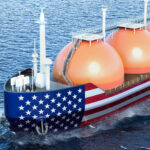LNG: Energy CEOs talk about exporting U.S. shale gas to Europe, Asia
“We are changing the way the global natural gas markets are going to function”—Charif Souki, Cheniere Energy CEO
The exportation of liquefied natural gas (LNG) and crude oil from the U.S. were hot topics at EnerCom’s The Oil & Gas Conference® 20.
Marcellus producer Range Resources is well positioned to sell its gas abroad
Oil & Gas 360® talked to energy executives about the scale of the shale gas export market. From a producer’s standpoint working in the country’s largest gas play–the Marcellus natural gas resource in the Appalachian basin–Jeff Ventura told Oil & Gas 360® that in a commodity business there are three things you want: size, scale and quality.

Range Resources’ (ticker: RRC) chairman, president and CEO told Oil & Gas 360®, “We’re in the highest quality gas play, in the Marcellus, and according to a Wood Mackenzie study, we’re the lowest cost producer.”
With respect to scale, with its approximate one million acres in Appalachia, Range shows the largest footprint in the Marcellus shale. “If you have a good technical team, which we have, it enables them to do the same thing over and over again to drive capital efficiency and operating efficiency…having a large footprint allows you to take advantage of changes in technology and it allows for you to have a big inventory going into an upcycle,” Ventura told Oil & Gas 360®.
OAG360: Is Range in THE sweet spot of the Marcellus play?
VENTURA: When you map hydrocarbons in place for the Marcellus and Upper Devonian and Utica, the one area where you can stack all three areas is literally down in Southeast Pennsylvania in Washington County. Even more important, when you look at our EURs per thousand foot in the Marcellus coupled with the cost per thousand foot to get them, [Range] is really in the top in the southwest part of the play and among the best in the entire play … there’s better infrastructure down there, plus you have the advantage of dry [gas] versus wet, so we believe we are in the sweet spot.
Transporting U.S. Shale Gas and NGLs to Market
Talking about Range’s access to infrastructure in the region, specifically referring to the Mariner East-1 pipeline, Ventura said, “we have the lion’s share of that project; we have 20,000 barrels per day of propane which is about 80% of the capacity and 20,000 barrels of ethane. … We’re the only producer that has firm transportation on the project. What it will do is allow us to export ethane to Europe. We’ll be the first company to really export ethane out of [North America]. Combined with our other projects, in terms of natural gas liquids, once Mariner East is up and running it’s about a $90-million uplift for us, and that should be in the fourth quarter.
When asked about exporting shale gas as LNG, Ventura said, “Range has signed and announced about 200 million [cubic feet] per day of contracts. … it’s really important for the industry. LNG exports should be on the order of 10 billion cubic feet per day, starting with Cheniere, and ramping each and every year.
“We see about 20 Bcf per day of incremental natural gas demand by 2020, and I think demand will actually surprise to the upside because it’s a cleaner, better fuel,” Range CEO Jeff Ventura told Oil & Gas 360® in an exclusive video interview at The Oil & Gas Conference® 20.
Liquefying U.S. shale gas for international customers

Cheniere Energy CEO Charif Souki also spoke with Oil & Gas 360® in an exclusive video interview at the EnerCom conference. Cheniere has a number of hydrocarbons export projects underway in various stages of construction in Texas and Louisiana, and it is positioned to be the first U.S. energy exporter to begin production of liquefied natural gas (LNG), beginning in Q4 2015 at its Sabine Pass facility in Louisiana.
“There is an enormous amount of infrastructure already in place in the United States, which is one of the things that gives us a competitive advantage compared to the rest of the world,” Souki told Oil & Gas 360® at the EnerCom conference. “However, it’s not always going in the right direction.”
“Five years ago no one would have predicted that the Northeast would become a net exporter of gas … and yet here we are now producing 20 Bcf a day in the Northeast and consuming only 10-12 [Bcf]. So all of a sudden we’ve had to reverse pipelines and send gas from the Northeast down to the Gulf Coast … straining the ability of the market to absorb all this gas that has been produced,” said Souki.
OAG360: Some energy analysts are writing about headwinds for LNG, which involve factors like incoming Australian capacity, China’s slowdown and India sticking with cheap coal; so how can Cheniere’s pricing structure hold off your competition in the global LNG market?
SOUKI: Headwinds are good. Because if it were easy, everybody would be doing it. … In our case we have very, very competitive costs—we have the lowest cost of gas in the world; we have very, very low cost of infrastructure building, including our own terminals. It gives us a huge competitive advantage compared to the rest of the world in terms of building liquefaction capacity and supplying the world with LNG. So it may be difficult to greenlight some new projects today around the world, but for us as we continue to build our platform we can make money at very low prices compared to the competition and so we are very comfortable in this environment.
When asked about Cheniere’s plans for a liquids export terminal will coincide with lifting the U.S. ban on crude oil exports, Souki said, “Yes, I am convinced that the export ban will be removed simply because it’s the natural thing to do; it has no reason for existing anymore. And having been doing what I’m doing for the last 15-20 years in the U.S., I have found that we always end up doing what’s right for the most people. Even in difficult regulatory environments it’s still fairly predictable. Today there is no excuse for a ban on exports of crude. … We are already the largest producer of oil on a global basis, and very soon we’re going to be in a position to export oil to the rest of the world. And it doesn’t sit well advocating free markets and market forces and deregulation on a global basis if we’re going to enforce regulation on a domestic basis. So I am absolutely convinced that it’s just a matter of time until the ban is repealed and we’ll be able to export oil.
“[Cheniere has] a pretty important role both on a domestic basis and a global basis because we are changing the way the global natural gas markets are going to function.”
Video coverage of full CEO interviews from EnerCom’s The Oil & Gas Conference® may be found here.







